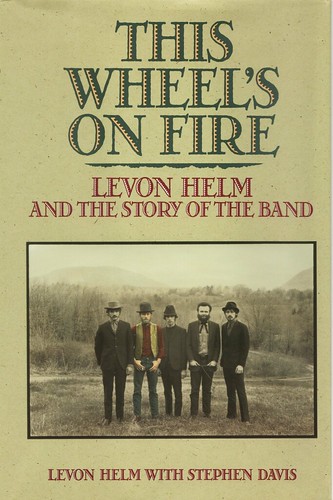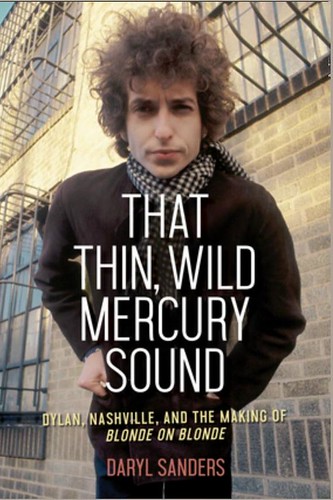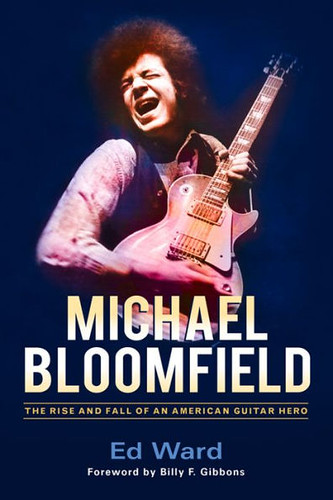
He was born Mark Lavon (yes, with an "a") Helm on May 26, 1940, but somewhere along the way, once he started touring and playing music, he became "Levon" (pronounced "Lee-von") Helm. The subtitle of
This Wheel's on Fire
is "Levon Helm and the Story of The Band." If you have to ask, "What band?" then you don't know your classic rock music, and you certainly aren't a fan of Bob Dylan's body of work.
Then again, if you are a moviegoer, you just might have seen Levon in the role of the coal miner, Ted Webb, in the 1980 screen adaptation of Loretta Lynn's autobiography Coal Miner's Daughter. He also played the role of Captain Jack Ridley, friend and fellow conspirator of Chuck Yeager in the film The Right Stuff. [I have watched this movie on numerous occasions (still have it on a double VHS!) and absolutely never realized that Ridley was played by Levon Helm....]
But back to the music: This is the story of how five musicians -- four Canadians and one Arkansawyer, multi-instrumentalists all -- came together over a span of years and endless road touring to eventually form The Band. To be honest, they never called themselves "the band" as they always thought this to be too pretentious: they were five individual musicians, each of whom went by their own name. But, while living in the Woodstock area of New York, the townfolk would simply refer to them as "the band": "Oh, he's in the band." And when their first album, Music From Big Pink, was released, they became The Band.
What motivated me to finally [see next to last paragraph] pick up this book and actually read it straight through? Believe it or not, this year marks the 50th anniversary of the release of Music From Big Pink (gawd, 50 years?), and the remaining two members of the band have opted to release a 50th Anniversary edition of this seminal work: a box set as well as a newly remastered (from the original analogue tapes) double-LP on pink vinyl.
Levon Helm writes:
"We wanted Music From Big Pink to sound like nothing anyone else was doing. This was our music, honed in isolation from the radio and contemporary trends, liberated from the world of the bars and the climate of the Dylan tours. We'd grown up with Ronnie Hawkins [Ronnie Hawkins and the Hawks], playing that quicker tempo of tunes. Now we cut our tempo, our pulse, right in half. The sense of teamwork and collaboration was incredible. Robbie [Robertson, vocals, guitar] was writing stuff that evoked simple pictures of American life. Richard [Manuel, vocals, keyboards, drums] was writing beautiful songs like 'In a Station' and 'Lonesome Suzie.' Garth [Hudson, keyboards, accordion, brass and woodwinds] took a great song like 'Chest Fever' and composed an organ prelude. Rick's [Danko, vocals, bass, fiddle, trombone] playing and singing were amazing, and that blend of the three voices -- Richard, Rick, and me -- sounded really rich after we'd worked with John Simon [producer] for a while."
And the reviews for Big Pink, to use Levon's own words, were "pretty good." Al Aronowitz, in Life magazine: "With Big Pink, the band dips into the well of tradition and comes up with bucketsful of clear, cool country soul that washes the ears with a sound never heard before. Traditionalists may not like it because it's too original. Pop faddists won't like it because it's too traditional." And in Rolling Stone, Al Kooper wrote: "I have chosen my album for 1968. Music From Big Pink is an event and should be treated as one....This album was recorded in approximately two weeks. There are people who will work their lives away in vain and not touch it."
I could go on and on with reviews of Big Pink as well as their follow-up album, simply called The Band, but I'd rather not overwhelm you with facts and opinions, but simply recommend a few albums if, indeed, you are not familiar with the music:
- Music From Big Pink (1968)
- The Band (1969)
- Bob Dylan/The Band - Before the Flood (1974)
- Bob Dylan & The Band - The Basement Tapes (1975)
- Northern Lights - Southern Cross (1975)
- Levon Helm - Dirt Farmer (2007, Grammy Award for Best Traditional Folk Album)
- Levon Helm - Electric Dirt (2009, Grammy Award for Best Americana Album)
I've been reading the 1993 hardbound edition of this book, which I've had in my library, well, since 1993(!), but while looking the title up on Amazon I have learned that Chicago Review Press published a trade paperback edition in 2000, and then a "Revised Edition" in 2013. If you are intrigued by my post and decide to pursue your own reading copy, try to snag the 2013 revised edition as it contains an additional chapter as well as an afterword, neither of which are in my copy. Levon Helm passed away in 2012, so these additions may include the last words we'll every hear from him.
"They were grown men who had climbed the mountain together, spoken to the gods, and returned to the valley, where they once again became mortal."
– The Philadelphia Inquirer
 So I asked for, and received, a copy of Daryl Sanders's recently published tome, That Thin, Wild Mercury Sound
So I asked for, and received, a copy of Daryl Sanders's recently published tome, That Thin, Wild Mercury Sound

 : a stunning three-LP box set mastered at 45 RPM. This LP release is no longer available (except on the secondary market), but the Super Audio CD (SACD) version is still being sold at retail, and that is the link I've provided.
: a stunning three-LP box set mastered at 45 RPM. This LP release is no longer available (except on the secondary market), but the Super Audio CD (SACD) version is still being sold at retail, and that is the link I've provided.

